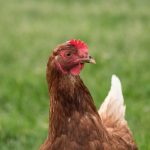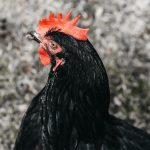Chickens are susceptible to various diseases that can affect their health and productivity. Common ailments include Marek’s disease, infectious bronchitis, coccidiosis, Newcastle disease, and avian influenza. Marek’s disease is a highly contagious viral infection targeting the nervous system, causing paralysis and internal organ tumors.
Infectious bronchitis, a respiratory disease, leads to coughing, sneezing, and reduced egg production. Coccidiosis, a parasitic intestinal infection, results in diarrhea and weight loss. Newcastle disease is a viral infection affecting both respiratory and nervous systems, while avian influenza is a highly contagious viral disease causing severe respiratory illness and potential death in chickens.
Effective disease prevention and management require chicken owners to be well-versed in the symptoms and risk factors associated with each condition. Understanding signs of illness and potential infection sources enables owners to implement proactive measures to protect their flocks and minimize disease spread. Regular health monitoring and assessments facilitate early detection of potential issues, allowing for timely intervention and treatment.
As chickens are valuable assets for farmers and backyard enthusiasts, it is essential to be knowledgeable about common diseases affecting them. Staying informed and proactive helps ensure the health and well-being of chicken flocks.
Table of Contents
- 1 Implementing Biosecurity Measures
- 2 Providing a Clean and Sanitary Environment
- 3 Monitoring and Managing Chicken Health
- 4 Vaccinating and Preventative Measures
- 5 Quarantine and Isolation Protocols
- 6 Seeking Veterinary Care and Support
- 7 FAQs
- 7.1 What are some common diseases that can affect chickens?
- 7.2 How can I prevent diseases in my chicken flock?
- 7.3 What are some biosecurity measures I can take to keep my chickens disease free?
- 7.4 What should I include in my chicken’s diet to keep them healthy?
- 7.5 How can I monitor the health of my chickens regularly?
Key Takeaways
- Understanding common chicken diseases is crucial for early detection and treatment.
- Implementing biosecurity measures can help prevent the spread of diseases among chickens.
- Providing a clean and sanitary environment is essential for maintaining chicken health.
- Monitoring and managing chicken health regularly can help prevent outbreaks of diseases.
- Vaccinating and taking preventative measures can significantly reduce the risk of chicken diseases.
Implementing Biosecurity Measures
Controlling Access to the Flock Area
Controlling access to the flock area is a vital aspect of biosecurity. This involves limiting the number of people who come into contact with the chickens and ensuring that visitors follow proper biosecurity protocols. This can be achieved by providing designated entry points, requiring visitors to wear protective clothing and footwear, and providing hand-washing stations.
Minimizing Exposure to Wild Birds and Other Animals
It is essential to minimize contact with wild birds and other animals that may carry diseases that can be transmitted to chickens. This can be achieved by keeping the flock area clean and free of debris, removing any food sources that may attract wild birds, and ensuring that the flock area is securely fenced.
Maintaining Good Hygiene and Sanitation Practices
Good hygiene and sanitation practices are critical for preventing disease transmission. This includes regularly cleaning and disinfecting the chicken coop and equipment, as well as practicing proper waste management to reduce the risk of contamination. By maintaining a clean and sanitary environment, chicken owners can help minimize the spread of pathogens and reduce the risk of disease outbreaks.
Providing a Clean and Sanitary Environment

Maintaining a clean and sanitary environment is essential for promoting the health and well-being of chicken flocks. This includes regularly cleaning and disinfecting the chicken coop, providing proper ventilation, and managing waste effectively. By creating a clean and sanitary environment, chicken owners can help reduce the risk of disease transmission and promote overall flock health.
Regular cleaning and disinfection of the chicken coop is crucial for preventing the buildup of pathogens and reducing the risk of disease transmission. This includes removing soiled bedding, scrubbing surfaces with a disinfectant, and allowing adequate time for the area to dry before reintroducing the birds. Additionally, proper ventilation is important for maintaining air quality and reducing the risk of respiratory illnesses.
Effective waste management is also essential for promoting a clean and sanitary environment. This includes properly disposing of manure and other waste materials to prevent contamination of the flock area. By managing waste effectively, chicken owners can help reduce the risk of disease transmission and create a healthier environment for their birds.
By providing a clean and sanitary environment, chicken owners can help promote the health and well-being of their flocks and reduce the risk of common diseases.
Monitoring and Managing Chicken Health
Regular monitoring and health assessments are essential for identifying potential issues early on and managing the overall health of chicken flocks. This includes observing behavior and appearance, checking for signs of illness, and conducting regular health checks. By staying vigilant and proactive, chicken owners can help ensure the well-being of their birds and minimize the impact of common diseases.
Observing behavior and appearance can provide valuable insights into the health of chicken flocks. This includes monitoring activity levels, eating habits, and social interactions, as well as checking for any changes in appearance or behavior that may indicate illness. By staying attentive to these cues, chicken owners can identify potential issues early on and take appropriate action.
Regular health checks are also important for monitoring the overall well-being of chicken flocks. This may include checking for signs of illness, such as abnormal droppings, respiratory symptoms, or changes in egg production. Additionally, routine examinations by a veterinarian can help identify any potential health concerns and provide guidance on managing the overall health of the flock.
By monitoring and managing chicken health, owners can help identify potential issues early on, take proactive measures to protect their flocks from common diseases, and promote overall well-being.
Vaccinating and Preventative Measures
Vaccinating chickens against common diseases is an important preventative measure for protecting their health and well-being. This includes administering vaccines for Marek’s disease, infectious bronchitis, Newcastle disease, avian influenza, and other common illnesses. By vaccinating their flocks, chicken owners can help reduce the risk of disease transmission and promote overall flock health.
Administering vaccines according to a recommended schedule is crucial for ensuring their effectiveness in protecting against common diseases. This may involve working with a veterinarian to develop a vaccination plan that aligns with the specific needs of the flock. Additionally, it’s important to keep detailed records of vaccinations to track their effectiveness and ensure that all birds receive proper protection.
In addition to vaccination, implementing other preventative measures can help further protect chicken flocks from common diseases. This may include providing a balanced diet to support immune function, practicing good biosecurity measures to reduce the risk of disease transmission, and maintaining a clean and sanitary environment to minimize exposure to pathogens. By vaccinating chickens against common diseases and implementing other preventative measures, owners can help protect their flocks from illness and promote overall health and well-being.
Quarantine and Isolation Protocols

Isolating Sick or Newly Acquired Birds
Isolating sick or newly acquired birds from the rest of the flock is crucial for preventing the spread of illness. This involves housing sick or new birds in a separate area with limited contact with other birds until they have been assessed by a veterinarian or deemed healthy enough to reintegrate into the flock.
Quarantine Measures for New Additions
Implementing quarantine measures for new additions to the flock can help reduce the risk of introducing diseases from outside sources. This includes keeping new birds separate from the rest of the flock for a period of time to ensure they are healthy and free of disease.
Biosecurity Protocols
Following proper biosecurity protocols is also important for minimizing the risk of disease transmission during quarantine and isolation periods. This includes practicing good hygiene and sanitation, controlling access to isolated areas, and limiting exposure to wild birds or other potential sources of infection. By establishing quarantine and isolation protocols, chicken owners can help prevent the spread of common diseases among their flocks and promote overall health and well-being.
Seeking Veterinary Care and Support
Seeking veterinary care and support is essential for managing the health of chicken flocks and addressing any potential issues that may arise. This includes working with a veterinarian to develop a comprehensive health management plan, seeking guidance on preventative measures such as vaccination schedules, and obtaining prompt treatment for any illnesses or injuries that may occur. By seeking veterinary care and support, chicken owners can help ensure the well-being of their flocks and minimize the impact of common diseases.
Developing a comprehensive health management plan in collaboration with a veterinarian is important for addressing the specific needs of a chicken flock. This may involve regular check-ups, vaccinations, parasite control, and guidance on nutrition to support overall health. Additionally, veterinarians can provide valuable insights into managing common diseases such as Marek’s disease, infectious bronchitis, coccidiosis, Newcastle disease, avian influenza, and others.
Obtaining prompt treatment for any illnesses or injuries that may occur is crucial for minimizing their impact on flock health. This may involve seeking veterinary care at the first sign of illness or injury to ensure timely intervention and appropriate treatment. Additionally, veterinarians can provide guidance on managing outbreaks or addressing any potential concerns related to common diseases.
By seeking veterinary care and support, chicken owners can help ensure the health and well-being of their flocks while minimizing the impact of common diseases.
If you’re interested in keeping chickens disease-free, you may also want to check out this article on what vegetables do quails eat. It’s important to ensure that all of your poultry, not just chickens, are receiving the proper nutrition to stay healthy and disease-free.
FAQs
What are some common diseases that can affect chickens?
Some common diseases that can affect chickens include Marek’s disease, coccidiosis, infectious bronchitis, avian influenza, and Newcastle disease.
How can I prevent diseases in my chicken flock?
To prevent diseases in your chicken flock, it is important to practice good biosecurity measures, keep the coop and surrounding areas clean, provide a balanced diet, and monitor the health of your chickens regularly.
What are some biosecurity measures I can take to keep my chickens disease free?
Biosecurity measures to keep chickens disease free include limiting visitors to the coop, quarantining new birds before introducing them to the flock, and using foot baths and hand sanitizers when entering and exiting the coop area.
What should I include in my chicken’s diet to keep them healthy?
A balanced diet for chickens should include a mix of grains, protein, vitamins, and minerals. It is important to provide access to clean water at all times and avoid feeding them spoiled or moldy food.
How can I monitor the health of my chickens regularly?
Regularly monitoring the health of your chickens involves observing their behavior, checking for any signs of illness or injury, and conducting routine health checks such as examining their eyes, comb, and vent. It is also important to consult with a veterinarian if you notice any concerning symptoms.
Meet Walter, the feathered-friend fanatic of Florida! Nestled in the sunshine state, Walter struts through life with his feathered companions, clucking his way to happiness. With a coop that’s fancier than a five-star hotel, he’s the Don Juan of the chicken world. When he’s not teaching his hens to do the cha-cha, you’ll find him in a heated debate with his prized rooster, Sir Clucks-a-Lot. Walter’s poultry passion is no yolk; he’s the sunny-side-up guy you never knew you needed in your flock of friends!







